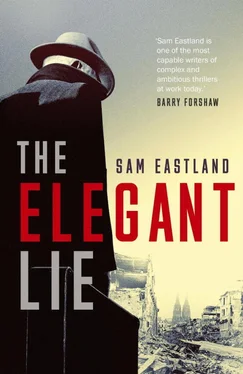Sam Eastland
THE ELEGANT LIE
For P. Q.
My Captain and my friend.
Cologne, Germany
June 1949
When the guard came to his cell, Nathan Carter was already awake and sitting on the edge of his bunk. It was 5 a.m. He had not slept all night, afraid that this was only one of many dreams he’d had, in which the day of his release from Langsdorf military prison turned out to be nothing more than a figment of his imagination.
Carter was six foot tall with dark, short-cropped hair and brown eyes in which the irises could barely be distinguished from the pupils. His chin and cheeks were scruffed with a week’s growth of beard and his normally slim build had been made considerably slimmer by the time he’d spent in prison. He had a habit of keeping his fingers tucked inside his palms, as if permanently conscious of their vulnerability. The expression on his face was thoughtful and closed, but otherwise unreadable. He looked like what he was◦– a man who kept his feelings to himself◦– but he also possessed the extraordinary ability of being able to walk into a crowded room and, with no outward sign of effort, emerge from that room with every other person having noticed he was there. Or he could step into that same space and leave again without anyone being able to recall with any certainty that they had spoken to him, or heard a single word he said, or even seen him there at all. To be remembered, or not remembered, was a skill he had turned to his advantage. It had also saved his life on more than one occasion.
The guard motioned for Carter to follow and, in the tomb-like silence of the prison before dawn, they made their way to the mess hall, which was empty at this hour except for the night duty staff, eating their breakfasts before they headed home.
Carter sat by himself at a table on the other side of the hall from the prison workers. A segmented metal tray was put in front of him, on which lay a splat of powdered eggs, half a slice of bread and a small, shrivelled apple. These were the same rations as the guards. It was the best meal he’d had in a long time. He ate everything quickly and without registering the taste of the food, gnawing the apple down to its core before eating the core as well. From a brown Bakelite cup, he drank a cup of water whose taste of dead leaves, the result of being passed through rusty pipes, was so familiar to him now that he had forgotten it could be any different.
After five minutes, the guard ordered him to his feet. What few words the guard pronounced were devoid of any feeling, as if he were speaking to some muted form of life which could not be expected to comprehend the complexities of human emotion.
Carter did not look at the guard, careful not to make eye contact or to move in anything other than a submissive, shoulder-hunched plod. To do anything else could be perceived, depending upon the mood of the guard, as a threatening gesture. The guards carried truncheons made from hard, black rubber and they always aimed for the face. One swipe across the cheek would shatter the delicate bone and either break the nose as well or else crack the skull’s nearly paper-thin orbit around the eye socket. Both scenarios guaranteed an injury from which the victim would never fully recover.
With the guard following close on his heels, Carter passed through the first of several barred gates which separated prisoners from the outside world. Only now did he dare to believe that this might not be a dream, after all.
He was taken to a room that was crowded with racks of old trousers, shoes and coats. The place reeked heavily of mothballs. There, he stripped out of his denim prison overalls while the guard picked out a set of clothes, roughly eyeing him up for size, and threw them at his feet. As he dressed in the poorly fitting garments, he smelled the sweat of other men. The shoes he had been given, their leather cracked and heels worn down, were too small, but he was afraid to ask for a different pair, so he crammed his feet into them anyway and hobbled out of the room.
The guard opened a steel door and Carter stepped out into the hazy shadows of the morning, the clean air shocking his lungs. Still following the guard, he walked along a narrow path, bordered on each side by high fences topped with barbed wire. To his left stood the prison yard, where he had been allowed to wander for one hour each day. To his right was a wide strip of earth, ploughed once a week to keep the soil soft, so that it would reveal the footsteps of anyone who had managed to escape the twin layers of prison fence, as well as the attention of the guards, looking down from the watchtowers through the telescopic sights of their rifles.
At the end of the path, Carter arrived at a guardhouse, where he signed his name in a ledger, beside the signature he had made when he arrived nine months before. He received an envelope containing a bus ticket and a food voucher, and then he was escorted through a door to the street.
There was a moment when Carter imagined that the soldier might offer some words of consolation, or even an insult perhaps, anything to break the spell of sullen hatred that had been cast between prisoner and guard. But the man said nothing. He just shut the door to the guardhouse and was gone.
Having spent so long imagining his freedom, Carter’s first thought on finding himself once more in the world was to knock on the door of the guardhouse and ask to be let back into prison. He worried that the months spent in Langsdorf had left him incapable of looking after himself, beyond the basic function of survival as a convict.
Before beginning his sentence, Carter had prepared himself, as much as he could, for the physical discomfort of prison, for the shockingly bad food and for the degradation of existing as a number. But what he had not prepared for and what, in retrospect, nobody could anticipate, was the effect of the monotony of prison life. The one thing he could not stand to contemplate◦– and thousands upon thousands of times he had batted it down into the darkness of his thoughts, only to see it rise again into the forefront of his mind, like an apple bobbing in a bucket of water◦– was the time he would never get back.
There was a saying at Langsdorf that a man only served two days in prison◦– the day he arrived and the day he left. Everything else, no matter how long the sentence, belonged in a separate world, in which the accounting of time was reckoned on a different set of clocks and calendars, which evaporated into nothingness the moment that door closed behind you.
And it was true. He could feel it◦– the terrible sameness of those days inside his cell, the brutality of wasted hours turning in upon itself, already half forgotten. But what the saying didn’t clarify was that the place in your mind where those two days joined together, your first day and your last, could not be rendered with some tidy pencil line, like the one on which you signed your name inside the Langsdorf prison ledger. Instead, it was a ragged wound, Frankenstein-stitched like the chest of an autopsied corpse. And however you might succeed in wiping from your brain the months or years you spent inside, that scar would always be there to remind you.
The road that led away from Langsdorf was named the Seltnerallee. It had once been bordered by rows of neat cottages, which provided housing for the prison staff. The prison itself had been built in the early 1900s to accommodate medium security convicts from the military district of Cologne. During the Second World War, the prison had been converted into an overflow for the barracks of the 153rd Infantry Regiment, which drew recruits from the surrounding area. At the time, there was no need for a military prison in Langsdorf, since anyone who might have served time there was either shot or transferred to penal regiments on the Eastern Front.
Читать дальше











